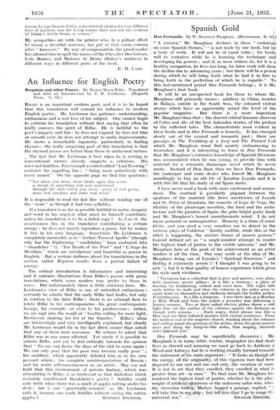_ Spanish Gold
" A wurrra," Mr. Maugham declares in these " variations on some Spanish themes," " is not made by nne -book, but bbr a body of work. It will not be of equal value ; his boo*; will be tentative while he is learning the technique and developing his powers ; and if, as most writers do, for it is a
healthy occupation, he lives too long, his later work will show the decline due to advancing years ; but there will 'be a period
during which he will bring forth what he had it in him to bring forth in the perfection of which he is capable." To this last-mentioned period Don Fernando belongs ; it is Mr. Maugham's best book.
It will be an unexpected book for those to whom Mr.
Maugham still primarily means : adultery in China, murder in Malaya, suicide in the South Seas, the coloured violent
stories which have so appreciably raised the level of the popular magazine. But there is a more important Mr. Maugham than that : the shrewd critical humane observer of Cakes and Ale, of the best Ashenden stories, of the preface to the collected tales. The characteristic most evident in these books and in Don Fernando is honesty. It has emerged slowly out of the cynical and romantic past ; there are passages in The Trembling of a Leaf and The Painted Veil which Mr. Maugham - must find acutely embarrassing to r remember, and it is interesting to learn in Don Fernando that Mr. Maugham'S extensive knowledge of Spanish literature
was accumulated when he was young, to provide him with material for a romantic Juanesque novel which he never wrote. Instead of Don Juan then we have Don Fernando, the innkeeper and curio dealer 'who forced Mr. Mmigham unwillingly to buy an old life of Ignatius Loyala and it is With this life that his study of old Spain starts.
I have never read a book with more excitement and amuse- ment. The contrast is peculiarly piquant between the opulence of the material (the fierce asceticisms of Loyala and St. Peter of Alcantara, the conceits of Lope de Vega, the ribaldry of the picaresque novelists, the food and the archi- tecture and the painters of Spain, the grim bright goaty land) and Mr. Maugham's honest unenthusiastic mind. I do not mean pedantic or unimaginative. Honesty is a form of sensi- tivity, and you need a very sensitive ear to detect in the verbose plays of Calderon " faintly audible, while this or the other is happening, the sinister drums of unseen powers." Conrad defined art as " a single-minded attempt to render the highest kind of justice to the visible universe," and Mr. Maugham here at the peak of his achievement as an artist renders it all the time. One may smile at the idea of Mr. Maugham doing one of Loyala's " Spiritual Exercises " and finding it extremely severe (" I thought I was going to be sick "), but it is that quality of honest experience which gives his style such vividness.
" Tarragona has a cathedral that is grey and austere, very plain, with immense, severe pillars ; it is like a fortress ; a place of worship for headstrong, violent and cruel men. The night falls early within its walls and then the columns in the aisles seem to squat down on themselves and darkness shrouds the Gothic -arches; It terrifies you. It is like a dungeon. I was there last on a Monday in Holy' Week and from the pulpit a preacher was delivering a Lenten sermon. Two or three naked electric globes threw a cold light that cut the outline of the columns against the darkness as though with scissors. . . . Each angry, florid phrase was like a blow and one blow followed another with vicious insistence. From the farthest end of the majestic church, winding about the columns and curling round the groining of the arches, down thegreat austere nave and along the dungeon-like aisles, that rasping, shrewish
voice 'pursued- you." •
Don Fernancrti may be superficially. discursive ; Mr. Maughant is in turns critic, tourist, biographer .(to find short liyes as shrewd and amusing we must "go 'back to Anthony It Wood and Aubrey), but lie is working steadily forward towards the statement of his main argument : " It looks as thmigh all the energy, all the originality, of this vigorous race had been disposed to one end and one end only, the creation of man. It is riot 'in art -Chat ;they excelled, they excelled in what is greater than art-1n man." To that man Mr. Maughain has rendered the highest kind of justice, whether he is the play- wright of artificial situations or the Unknown sailor who, wiser' the Armenian bistioti,- Martyr, begged a passage, age, replied, " will takehim rolls hip ; but _tell „him that I go. to range the








































 Previous page
Previous page